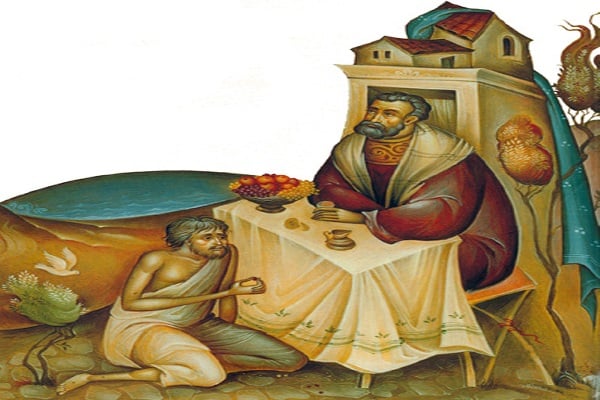THE ‘LAZARUS’ AROUND US CAN INFLUENCE OUR ETERNAL DESTINY
First Reading: Jeremiah 17:5-10
Responsorial Psalm: Ps. 1:1-4,6
Gospel Reading: Luke 16:19-31
___________________________________
Sadly, our contemporary age is characterized by the pursuit of the “good life” through what is known as consumerism and self-centeredness. The law of Capitalist accumulation reveals that the greater the accumulation of wealth by one class, the more there is an accumulation of poverty, misery, and degradation of another class. This never-ending pursuit creates an imbalance in society, leaving some extremely wealthy and many others extremely poor. Saint Thomas Aquinas teaches that man’s apparently infinite desire for riches is disordered and wholly different from our infinite desire for God. The more we possess God, the more we know and love him; while the more we possess riches, the more we despise what we have and seek other things because when we possess them we realize their insufficiency. Material possession is capable of turning man into a slave and making man live a life of independence from God. Today, both the First reading and the Gospel, with very simple images but painted in strong colours, confront us with the fact that it is in this life that we decide our eternal destiny (blessing or curse) through our closeness and assistance of those who are in need.
Dear friends, anyone who, in this life, puts his trust in human means and material things and, above all, anyone who distances himself from the Lord and organizes his existence independently of God, is cursed. On the contrary, anyone who trusts in the Lord, recognizes his condition as a creature, loves his fellowman, is dependent on and loved by God, is “blessed” because he carries in his heart a seed of eternity that will blossom in eternal happiness and peace. A true trust in God is always accompanied by solidarity with the poor – both materially and spiritually, and also with the sick and aged, victims of setbacks and oppression of any kind, etc. These become the hallmark of today’s message as reflected in the readings.
Taking the Gospel narrative as our point of departure, we hear the popular story of the rich man and Lazarus. It is interesting to know that the name Lazarus means “God helps” (God is my helper). Poor Lazarus is characterized by silence, both in the face of life’s trials and in the face of the lack of attention from those from whom he expected help. He does not cry out against God or against men. He remains silent and patient in his physical, psychological, and spiritual sufferings, and above all, places his trust and dependence on God. On the other hand, the rich man lived his life as if everything depended on him, and had everything at his beck and call, consuming his wealth and exhibiting individualism. He ignored the necessity of the poor around him. Finally, death appears and everything changes. As his name implies, God helped Lazarus because he placed his trust in God. He was carried by the angels into Abraham’s bosom where suffering and pain exist no more. Whereas, the rich man who trusted in human means and material things in the spirit of individualism and consumerism but never trusted in God faced the consequences of the choice he made while on earth.
Dearly beloved in Christ, our trust in God leads us to sympathize with Jesus’ love for all men, a “love that saves.” Like Jesus, we can be present and identify with all those who are suffering or experiencing other forms of difficulties and challenges in life because their presence around us can in a sense influence our eternal destiny; if we ignore them, it is Christ we are ignoring, but if we love and pay attention to their needs, we do that to Christ. Thus, in the face of the poor today, we must see that of Jesus, who became poor to enrich us with his poverty. The season of Lent is a good time to see how the material things we have can contribute to carrying out the mission that God has entrusted to us. We should learn (in the spirit of almsgiving) to detach ourselves more easily from the material things that do not contribute to the mission entrusted by God. With this kind of poverty, we will learn to appreciate earthly goods to the extent that we see their value as a way of union and dependence on God and of service to others. Above all, let us ask God for the grace to clearly see the many “Lazaruses” who are at our “door,” begging for our attention and affection.
Shalom!
© Fr. Chinaka Justin Mbaeri, OSJ
Paroquia Nossa Senhora de Loreto, Vila Medeiros, São Paulo, Brazil
nozickcjoe@gmail.com / fadacjay@gmail.com
___________________________________
PS: Have you prayed your Rosary today?



Lord, teach us to see You in our neighbours.
Lord Jesus Christ teach us to see you in our neighbour & the Lazarus around us. Amen.
Lord teach me to You In our neighbors
Amen! Help me Lord to be sensitive and responsive to the poor and needy around me.